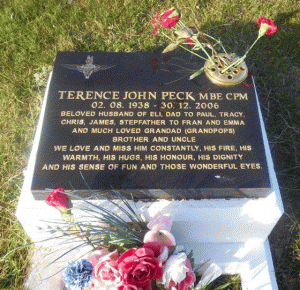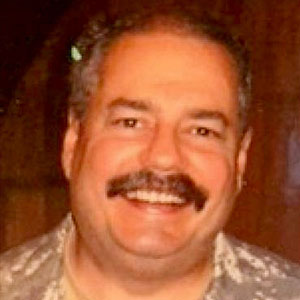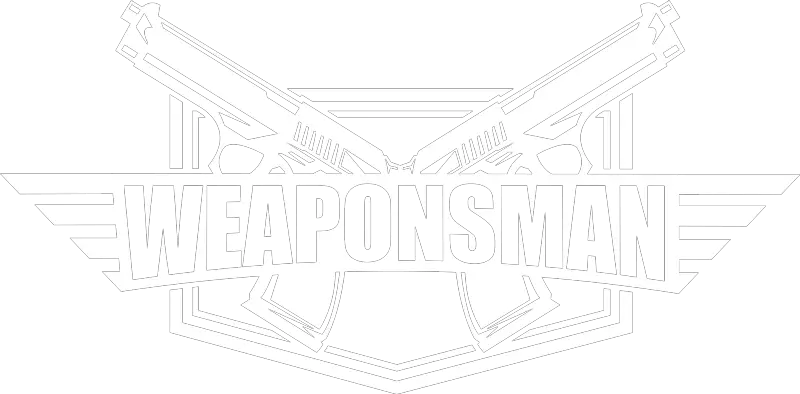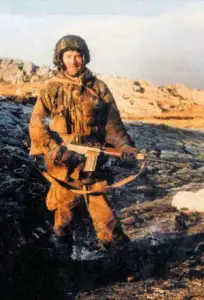Terrence John “Terry” Peck was a cop on a rural beat, in one of the last remaining backwaters of the British Empire, but he’d retired from the force — as Chief — some time before. But the people in his community — Stanley, which passed for the capital of the windswept Falkland Islands in the South Atlantic — were alarmed by the news, and he had to do something. The Falklands were a British possession, claimed centuries before, and settled by a hardened breed who called themselves “Kelpers” and considered themselves and their community as British as a bowler hat.
But Argentina also had a claim to the Falklands, which it calls the Islas Malvinas, and to the even more remote, generally uninhabited, abandoned whaling station of South Georgia Island, remembered today primarily for Shackleton’s crossing of the island. Argentina has pressed that claim with greater or lesser vigor for approximately two centuries itself. (At one time or another, since their discovery in the 17th Century, the islands were claimed by Britain, France, Spain and even the United States; but the Falklands have been continuously British since the Spanish governor bugged out in 1806 as a result of British victories over Spain in the Napoleonic Wars). In the spring of 1982 Argentine dictator Gen. Leopoldo Galtieri, struggling with the chronic bane of Argentine governments since Perón, an incompetently micromanaged economy, was looking for a good patriotic issue to distract his people from their woes.
 Invading the Falklands looked like a smart play. The British had a navy of similar size and power to Argentina’s, but it was one that was about to get smaller: several warships, including one of the RN’s only two carriers, had already been sold overseas and were pending delivery. Argentina had an old, but jet-capable, conventional carrier, and the British ships could carry only compromised STOVL Sea Harriers. The Falklands, moreover, were extremely distant from the UK, and only 400 miles from Argentine air bases. In early 1982 rumors spread in Buenos Aires, London and Port Stanley (capital of the Falklands) alike, that the Argentines were going to invade, to give the struggling people of metropolitan Argentina a great war victory over the garrison, which then comprised about a platoon of Royal Marines.
Invading the Falklands looked like a smart play. The British had a navy of similar size and power to Argentina’s, but it was one that was about to get smaller: several warships, including one of the RN’s only two carriers, had already been sold overseas and were pending delivery. Argentina had an old, but jet-capable, conventional carrier, and the British ships could carry only compromised STOVL Sea Harriers. The Falklands, moreover, were extremely distant from the UK, and only 400 miles from Argentine air bases. In early 1982 rumors spread in Buenos Aires, London and Port Stanley (capital of the Falklands) alike, that the Argentines were going to invade, to give the struggling people of metropolitan Argentina a great war victory over the garrison, which then comprised about a platoon of Royal Marines.
An Argentine “emergency landing” at Port Stanley was an excuse for senior military officers, who were onboard the military-operated “airliner”, to survey their objectives. This attempted special operation was so ineptly done that it was reported to London (and Washington) within the hour of the plane’s landing.
Despite that, the British Foreign Minister, Lord Carrington, insisted he could find a peaceful solution in negotiations. Like the Japanese before Pearl Harbor, Argentina continued bad-faith negotiations while planning a surprise attack. Now that the scene is set…
Terry Peck rejoined the force as a Special Constable. It was what he knew how to do, after all.
The next day Argentina invaded.
The Royal Marine fought with Argentine special operations forces for a while, but they were outnumbered, and finally ran low on ammunition. They surrendered. Their presence had never been intended to secure the islands against an invasion, but to make an invasion an act of war on Britain itself. They were, in fact, a bluff.
Galtieri called the bluff.
Humiliated, Carrington resigned. Some elements of British public opinion called for war.
Still, they were minority elements at this point. The smart money was on Britain caving to Argentina’s fait accompli. Regaining the islands would be costly and impractical — the Argentine garrison was going to be a lot larger than a platoon. Galtieri had plans for the islands — plans that involved a brutal Argentinization of the locals, like it or not, and a flood of settlers, rewarded with whatever might be looted there — mostly rocky pastures, and sheep. Today, we’d call the Argentine plans ethnic cleansing, but the term had yet to be coined in the Balkans Wars ten years ahead.
The British probably couldn’t do it, certainly wouldn’t do it. Why, they didn’t even consider the Kelpers British subjects, not real ones — they were lumped in with the West Indians and other former Commonwealth citizens in a literal second-class citizenship that was designed to keep them from becoming a burden on the dole: they were British, sort of, but they couldn’t come to England or Britain. Galtieri was handing them a you-know-what sandwich with Argentine citizenship, but at least it was real citizenship. It would improve their odds of immigrating to the UK!
But the Kelpers, you see, thought they were British, and so they thought that Britain might need some help. The Argentines never took the inhabitants of the city seriously, but after the invasion, an underground flourished overnight, which in the early stage primarily collected and communicated intellience to MI6, using methods that mostly remain classified, but are known to have included clandestine radio transmission and smuggling by British contract workers such as teachers, whom the Argies permitted (and even encouraged) to leave.
(One known method was an amateur radio operator, lighthouse keeper Reginald Silvey. The Argentines had a list of all hams in the islands, but Reg handed over his set and let the Argies knock down his antenna. The quick-thinking resister had fobbed the polite Argentine officer off with a spare set, and had already made another antenna — they never asked why his clothesline was made of metal wire. Silvey maintained contact with the UK throughout the occupation and transmitted, and received, a great deal of valuable information).
Terry Peck, for his part, was on the collection end of this enterprise, and provided many photographs of Argentine installations and activities. He carried a camera in a length of pipe, and told any curious Argentines that he was a plumber. Most of them weren’t curious enough to ask — everyone knows Englishmen are eccentric, right? (Meanwhile the other locals, who knew him well, suspected he had lost his mind).
Peck gathered intel for several days, but then the head of the Argentine military police element, an Irishman named Patrick/Patricio Dowling, somehow figured out who he was and what he was up to. Dowling started suspecting him, and decided to arrest him. But one of his “collaborating” local constables was actually supporting Peck from inside the Argentine effort, and the word got to him long before the Argies did.
Meanwhile, GCHQ had been monitoring Argie communications, but as the Argentines established their garrisons, they ran landlines — and went off the air, limiting the electronic spies’ “take.” Could the locals do anything? Terry couldn’t — he was on the run — but local veterinarian Steve Whitley found a castrating scissor was just the thing for communications lines. The Argies went back on the air, and patrols sought the wire-cutters, Whitley and his buddy, teacher Phil Middleton. (They also continued the clandestine photography Peck had also been doing).
With Stanley and environs too hot, Terry Peck lit out for the country, on a “borrowed” motorcycle. Being a former policeman means you know people, and one of the people he know expertly forged a new name onto Peck’s identity documents. As he traveled to outlying farms, he was pursued by Argentine officers seeking him in a Puma helicopter. The copter would land, the Argies would search for Peck and other fugitives, and then they’d leave. Once, he hid when the helicopter showed up; at the next farm, he had to brazen it out with the altered ID and the plumber story. To his relief (and, perhaps, surprise), it worked, and the correct Argentine officer reboarded his Puma and continued looking for the man he’d just politely taken leave of.
Fearing he’d bring the wrong kind of attention to the locals (none of whom ever refused him aid, he then became a one-man reconnaissance patrol, living rough in the bleak hills. He looked like a soldier, too, having armed himself with weapons buried by the surrendered Marines (another Kelper tipped him off as to where the guns were), and dressed himself in camouflage stashed by Naval personnel. He also acquired — from where, it’s not clear — a short-wave radio that let him communicate with far-flung settlements.
It was through the radio that Peck learned from San Carlos farmer Isobel Short that the men of the 5th Brigade had landed. In her improvised code, San Carlos was hosting “a lot of friends.” He took “his” motorcycle and raced to the nearest house with a telephone, and rang up San Carlos. “Let me speak to a British officer.”
To the Paras at San Carlos, Peck was a Godsend. He knew the area, and the people. He had just covered the ground they had to, in the opposite direction. He was clearly a man of versatile ability. The 3rd Battalion, Parachute Regiment, attached him to D “Patrol” Company and he was assigned to act as a guide during the move. But then, he overheard the British officers fretting about logistics. The Paras were not afraid of hiking the distance, “yomping” in the then-current British Army argot. But they had a lot of gear to move, and the battle plan had them moving it by Chinook HC.1 helicopter. The trouble with that plan was that one of the daring Argentine air attacks on the British fleet had hit the ship, Atlantic Conveyor, bringing up the ‘Hooks. All but one of the copters went up in in the Atlantic Conveyor inferno.
Peck had the answer to this. He dialed up the farmers whose generosity had fed and helped to equp him over his weeks of espionage and evasion, and called for help. And help came: Land Rovers, tractors, trailers and skids showed up and hauled Paras and their kit over the tundra-like pastures at speeds that couldn’t be a helicopter, unless the helicopter wasn’t there. That let the surviving HC.1, “Bravo November,” move only the most critical and urgent stores.
Terry Peck still wasn’t done. He, and fellow Kelper Vern Steen, participated in the reconnaissance of Mount Longdon, and then in the battle. At one point, Terry carried a wounded Para back to safety:
We carried him down this slope but sometimes we had to lie across him, because of the fire that was coming. We were catching it left, right and centre. It was lit up like Blackpool illuminations. It was really horrendous. We got this guy down into a crater caused by a shell. We had eight wounded in that hole with two medics, that’s how big the hole was.
The Land Rover logistical auxiliaries, under the “command” of Trudi McPhee (then Trudi Morrison), brought up munitions for the mortars and MGs. At the Argentine surrender, Terry Peck was on top of Mount Longdon with A Coy., Vern Steen was guarding prisoners, and Trudi and the volunteer drivers were still hauling stuff for the Crown.
The resisting islanders weren’t forgotten in the aftermath of the battle. Mrs Morrison was commended by the Task Force C-in-C, Terry Peck was made a Member of the Order of the British Empire, and (to his greater pride) an honorary member of 3rd Para. All the Kelpers were made in law what they had been in their minds all along, as they proved with their doughty resistance to occupation: British citizens with the same rights as any in England, Scotland, Wales or Norther Ireland.
Terry Peck lost his final battle, with cancer, in 2006, but his name deserves on as an inspiration to any who chafe under hostile occupation.
Sources
Uncredited. Behind Enemy Lines. Falklands: Untold Stories of the War in the South Atlantic. Stamford, Lincs.: Key Publishing, 2012. pp. 24-30.
Uncredited. Palace Barracks Memorial Gardens: the Falkland Islands. Retrieved from: http://www.palacebarracksmemorialgarden.co.uk/locationfi.html

Kevin was a former Special Forces weapons man (MOS 18B, before the 18 series, 11B with Skill Qualification Indicator of S). His focus was on weapons: their history, effects and employment. He started WeaponsMan.com in 2011 and operated it until he passed away in 2017. His work is being preserved here at the request of his family.


15 thoughts on “UW: Terry and the Particularized Intelligence”
Very enjoyable read. Thank you.
Very nicely done, hats off
The term ethnic cleansing is considerably older. Serbs have been ‘ethnically cleansing’ parts of Serbia as early as 1806, to get rid of the Turkish taint, and the term was probably in use by the time of Balkan Wars, in which the Serbs did similar things as in the 1990’s. The other combatants – Greeks, Turks, Bulgarians were not that different.
Yeah, Balkans, it’s not exactly Europe.
Good on yer, Mr. Peck
A war that allowed some very great men to shine.
Surgeon commander Rick Jolly is another one of those.
That is one heck of a story. When is the movie? Because it deserves it.
Thanks yet again for the history lesson. Truly interesting stuff.
Thanks for this post, it’s a gem. One quibble though….your secretary seems to lose parts of sentences sometimes:
“Fearing he’d bring then became a one-man reconnaissance patrol, living rough in the bleak hills.”.
Is the missing bit “retribution down upon his benefactors he”, or something along those lines?
Other than these oddments, a great site and still king of the daily bloglist. Say, where is Dr Bill, haven’t heard from him in the comments quite a while.
I dunno. Hope he’s OK. And not bored with us.
I’ll have a look at the sentence and see if I can recover what the hell I originally meant. You’re probably pretty close.
And to this day there are signs posted through Argentina declaring “Las Islas Malvinas Son De Argentina”, or something to that effect. Don’t recall the exact phraseology as it’s been over 20 years since I passed through there, but friends who’ve been there more recently tell me the signs are still up all over the place.
Thanks for this look into that particular squabble. It’s a part of the story I’d not heard before. There are a lot of lessons there for both sides of the equation when some outside force forcibly inserts itself into someone else’s domain.
Oh yeah, the current Evita-mini-me running the place stirs up Malvinas envy every year or so.
I hadn’t seen the Terry Peck story till I picked up the Falklands 30 magazine cited in the sources. Then I checked him out, and he was a no-kidding stud. Sad to say, I also learnt he’d passed on. Apparently he was noted for meeting any returning Paras coming back to the scene of the fight, for an evening of mutual fellowship and celebration.
Top gear had a run-in with some of the delusional malvinas son Argentinas crowd filming their Patagonia special.
Thank You
Terry Pecks story warms the cockles of my heart.
Thanks for this its a story id sort of heard but not in its entirety. Amazing man who found his moment. As ever beautifully written stuff
Jim
That’s Awesome!